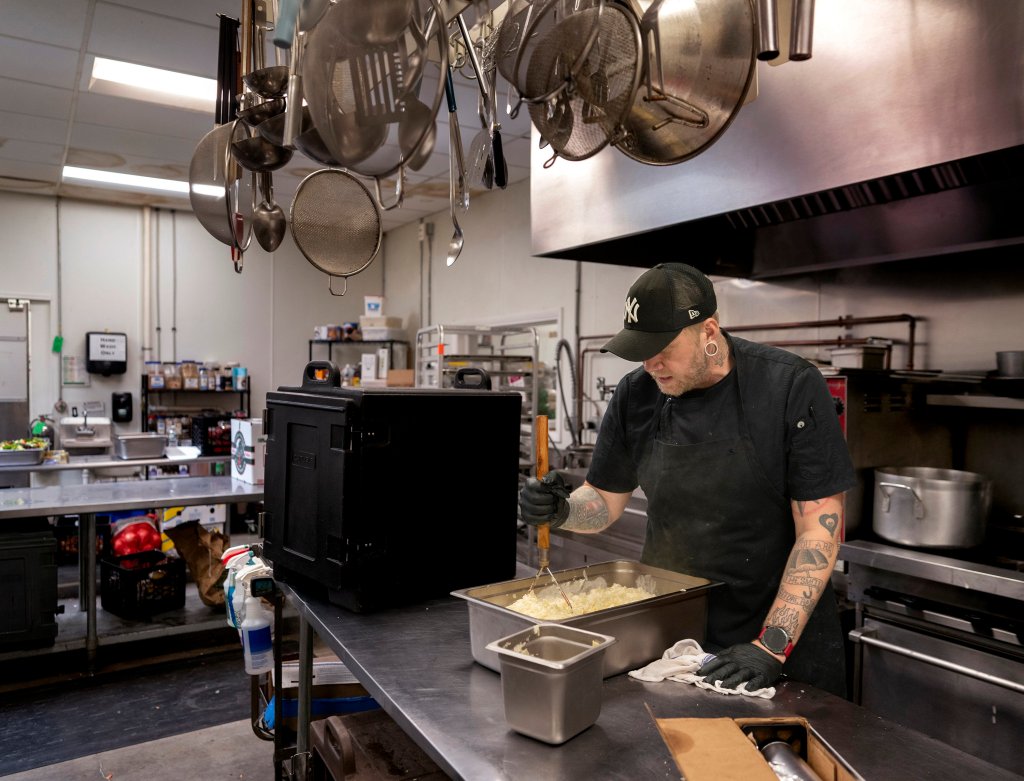 Eric Bufo mixes a cauliflower mash with black truffle cheddar in the Wayside Food Programs kitchen in Portland. (Gregory Rec/Staff Photographer)
Eric Bufo mixes a cauliflower mash with black truffle cheddar in the Wayside Food Programs kitchen in Portland. (Gregory Rec/Staff Photographer)
While Chef Eric Bufo pries a potful of ruby-red arils out of fresh pomegranates, he takes stock of the dishes he has underway on a recent Tuesday morning. He’ll use the arils to make pomegranate syrup for a salmon glaze. At the other end of the kitchen, he’d just finished tossing roasted Maine apples and Belanger Farms delicata squash with Kerrygold butter he browned and flavored with allspice, tarragon and Alaskan birch syrup; he’ll pair that dish with spice-rubbed pork rib roast.
Bufo isn’t running a fancy farm-to-table restaurant. He’s kitchen manager and head chef at Wayside Food Programs, where he works with a rotating volunteer crew to cook as many as 800 free meals a week for Greater Portland homeless shelters, schools, senior homes and other community centers where Mainers need hot, nourishing meals.
People might expect free community meals to be more humble: shepherd’s pie, American chop suey, simple stews. And sometimes they are. But at Wayside, Bufo has access to farm-fresh produce and high-quality proteins, a constant supply that’s refreshed with each morning’s donations. So he draws on his training at fine dining restaurants and as a private chef to cook highly seasonal, restaurant-quality meals.
“Since we have all this access to great ingredients, it’s more about creating food equity — giving people in need the access to the kind of food they might not have the opportunity to eat,” Bufo said. “We’re not sending out hot dogs and beans, or peanut butter and jelly sandwiches. We’ve had some really fantastic feedback from people. It’s a nice step up from what they expected.”
“The real kicker is that it’s all food that was discarded,” said Hannah McFarland, a community meals assistant at Wayside. “We really are a food rescue program.”
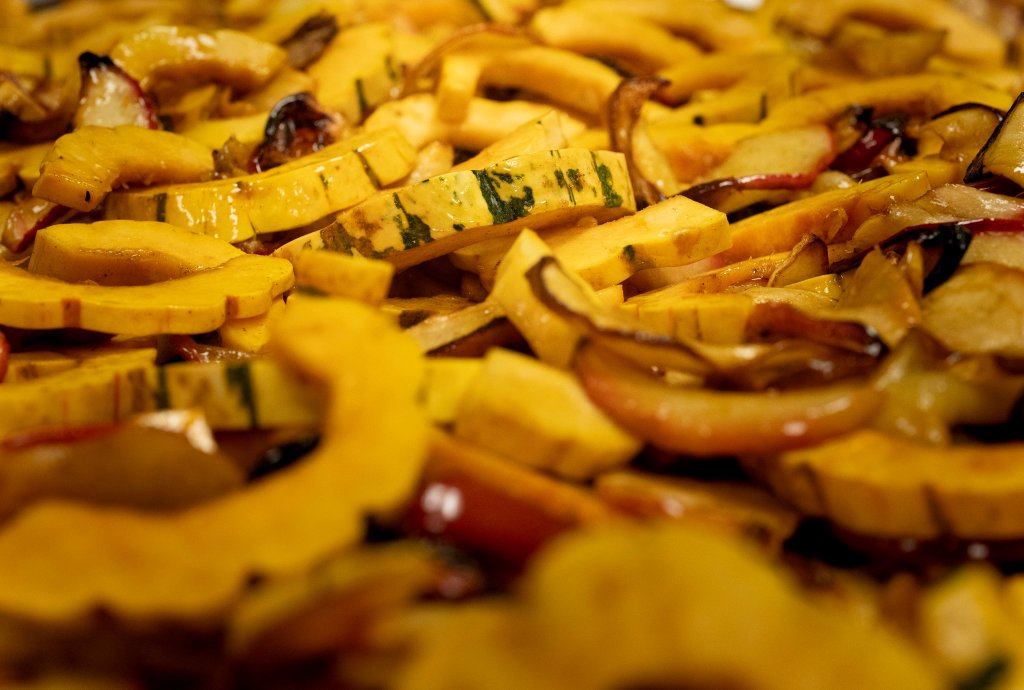 Bufo’s side dish in progress: delicata squash from R. Belanger & Sons Farm in Lewiston with Maine apples, tossed with Kerrygold brown butter. (Gregory Rec/Staff Photographer)
Bufo’s side dish in progress: delicata squash from R. Belanger & Sons Farm in Lewiston with Maine apples, tossed with Kerrygold brown butter. (Gregory Rec/Staff Photographer)
SEASONAL MEALS, LOCAL INGREDIENTS
Wayside’s community meals program relies on donated ingredients. In September alone, they received more than 115,000 pounds of food from local farms, fishermen, regional supermarkets, area grocers and wholesale distributors. Bufo has been amazed by the quality and quantity of the food that comes to the Wayside warehouse, which essentially serves as his pantry.
“Anything you could imagine you’d have access to in a restaurant, we also have access to,” Bufo said. “I send pictures of the produce we get to my friends who work in fine dining restaurants, and they’re like, ‘That’s crazy ― how are you getting this?’
“What’s wonderful is that because of what we get donated, we can do seasonal food just like restaurants,” he said. “We can cook in warmer, heavier tones now, a little more bright and oceanic in the summer and spring.”
Earlier this year, Wayside received a donation of several hundred pounds of flounder-like Gulf of Maine sand dab. Bufo whipped up a meal of scallop-stuffed sand dab with roasted fennel and orange beurre blanc that was delivered to a local shelter. In the first week of November, he made black garlic-rubbed prime rib and cauliflower mash with black truffle cheddar for about 80 people.
Bufo said Wayside hasn’t yet seen much of an uptick in demand caused by the recent SNAP crisis, but he allows there may be a delayed effect yet to come.
Preble Street’s community meals program draws from many of the same donation sources. But because they put out as many as 18,000 meals a week — up from 14,000 since the SNAP cuts — Preble Street can’t use premium proteins like Wayside.
But Preble Street cooks seasonal, expertly prepared dishes nonetheless, like a recent Wednesday meal of chickpea curry with local delicata squash, cauliflower, broccoli and carrots, served over rice. Preble Street has received more than 100,000 pounds of fresh local produce from Farms For Food Equity — a key donor to Maine food pantries and community kitchens — so far this year.
“We make everything 100% from scratch,” said Preble Street head chef Brian Grossman, a 20-year hospitality industry veteran and former executive chef of Bandaloop, a farm-to-table restaurant in Arundel. “We’re really thoughtful in the way we prepare our meals. We’re not just opening bags or cans.
“Good food should be accessible to everyone, not just the elite,” he continued. “I don’t think it should be a privilege. Everyone deserves a great, cooked-from-scratch meal. ”
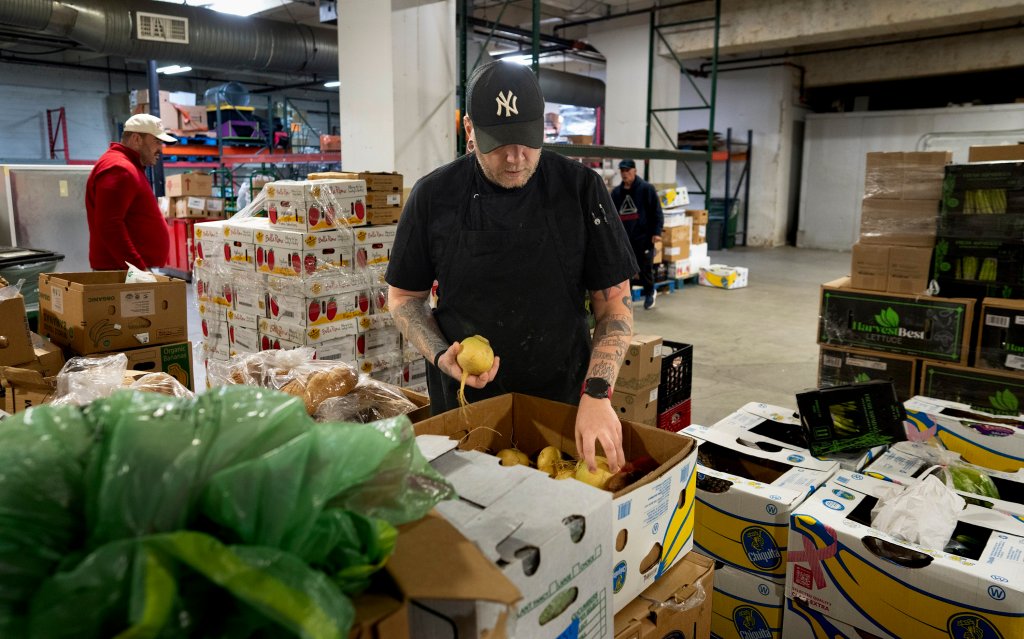 Eric Bufo inspects a box of onions that just arrived at the Wayside Foods Programs warehouse. Bufo’s meals depend on donated food that the program receives on any given day. (Gregory Rec/Staff Photographer)
Eric Bufo inspects a box of onions that just arrived at the Wayside Foods Programs warehouse. Bufo’s meals depend on donated food that the program receives on any given day. (Gregory Rec/Staff Photographer)
ELEVATED, BUT FAMILIAR
Bufo’s culinary career includes nearly 10 years cooking in New York City, as well as at restaurants and hotels in Connecticut and the Caribbean, and at Maine spots like Terlingua. But he often felt unsettled by a “disconnect” he noticed during his fine dining days.
“You work in a place making this beautiful food, but then many of the people outside who live in the community can’t afford to eat there,” said Bufo, who joined Wayside in August.
“He’s an incredibly talented chef,” Wayside Operations Manager Don Morrison said. “We’re fortunate to have him and so are our guests — ultimately they’re who really benefit from this. He’s definitely stepped up the game, that’s for sure. The quality of our food is better.”
As cheffy and technique-driven as some of his Wayside dishes seem, Bufo takes care to make them as accessible and familiar as possible for Wayside’s clients. The dab is presented simply as “stuffed fish,” while beef bourguignon with a crispy slab of puff pastry is served as “beef pot pie” — down-to-earth, yet accurate descriptions that cut to the chase and don’t alienate anyone.
“We apply the technique you would in fine dining, but we make it accessible,” Bufo said. “A lot of our people are elderly or Mainers who want New England classics, so we elevate it sightly, but try to keep it familiar.”
He’s not on a mission to broaden palates. Bufo knows the senior housing residents are some of Wayside’s most conservative eaters, and so their breakfast, like the one he’s prepared recently, will often consist of straightforward classics: scrambled eggs, home fries, sausage links and fruit salad. When he needs to find appropriate uses for some of the donated foods, he said he tries to find a happy medium, like smoked salmon omelets and banana bread French toast.
“We’ve been successful so far in bridging the gap between things that are new to them and things that are traditional,” said Bufo, as he bops back and forth between the kitchen and the warehouse to check donation deliveries. He racks up about 20,000 steps a day, according to his Fitbit, and already has 8,000 steps by 9 a.m.
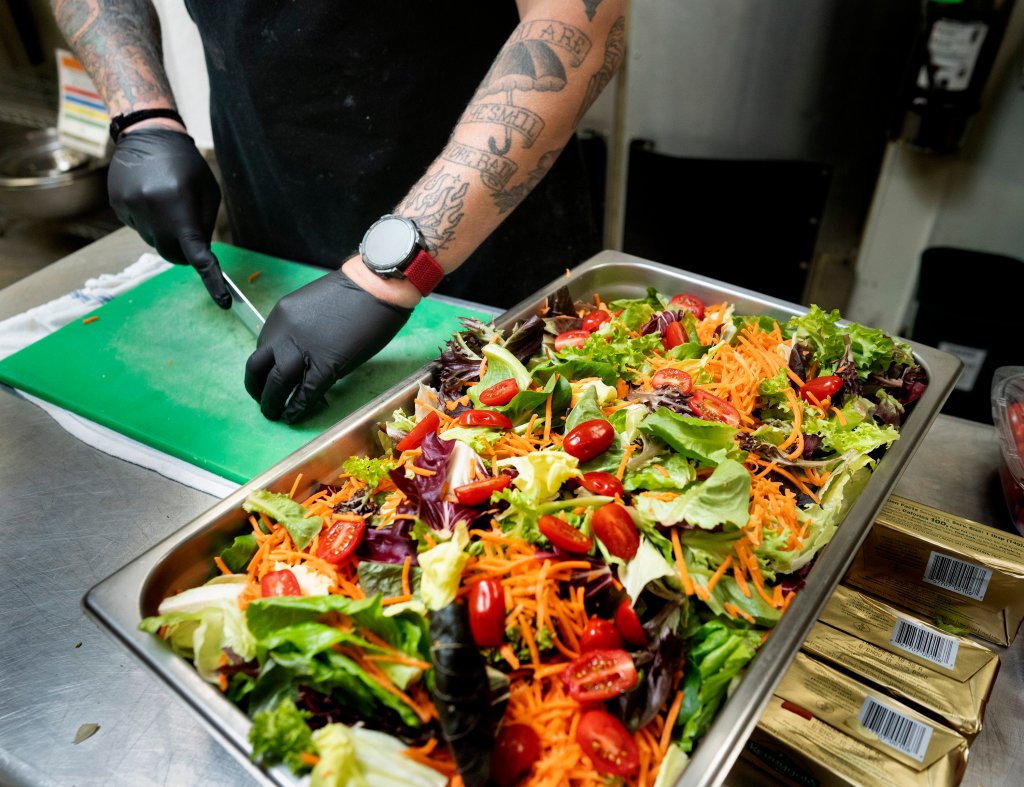 Bufo makes a salad with greens from The Buckle Farm in Unity. (Gregory Rec/Staff Photographer)
Bufo makes a salad with greens from The Buckle Farm in Unity. (Gregory Rec/Staff Photographer)
‘BE LIKE WATER’
Perhaps more remarkable than the restaurant-quality meals are the circumstances under which they’re made. Because Wayside operates exclusively on donations, Bufo doesn’t really know exactly what ingredients he’ll be working with on a given day until deliveries arrive at the warehouse. In this way, every shift for Bufo is like an episode of “Chopped,” the cooking competition show where chefs are given a basket of limited ingredients and judged on how well they can put together a meal.
Bufo prepares about six or seven meals each week at Wayside, and hasn’t repeated one yet in more than three months on the job. There’s no set menu for each week, or even a collection of Wayside recipes to consult. Bufo creates each meal based on what’s available and needs to be used first, drawing inspiration from dishes he’d created earlier in his culinary career.
Sometimes he may even have fully prepped for a meal when a perishable donation arrives — like fresh-caught sand dabs on ice — forcing him to draw up a new plan on the fly.
“I have to be malleable, do the Bruce Lee thing and be like water, but that’s the fun of it,” Bufo grins. “It’s constantly changing, and we have to pivot. The whole mission here is to prevent food waste. It’s a challenge sometimes, but a restaurant background gears you for that.”
“Sometimes it’s kind of funny because clients will ask us for a recipe, and we’re like, ‘Well, that doesn’t exist,” Morrison said. “It takes a certain type of personality to do this.”
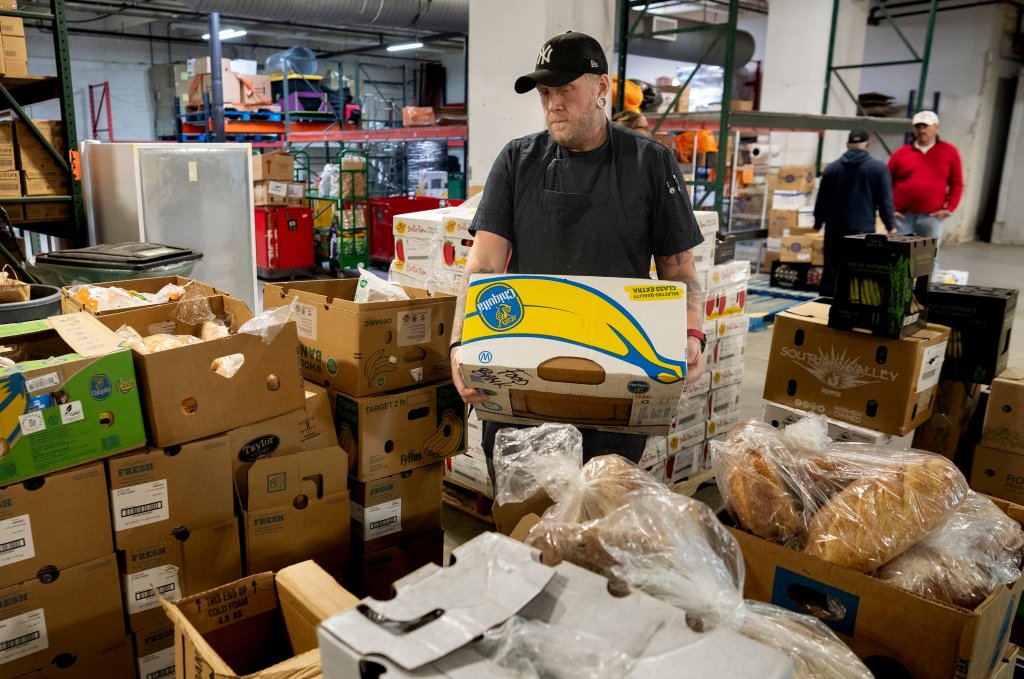 Eric Bufo, chef at the Wayside Food Programs in Portland, carries a box of onions through the Wayside warehouse. (Gregory Rec/Staff Photographer)
Eric Bufo, chef at the Wayside Food Programs in Portland, carries a box of onions through the Wayside warehouse. (Gregory Rec/Staff Photographer)
Menus are like a daily puzzle for community meals chefs to solve. “There’s quite a bit that happens on the fly day-to-day,” said Mike Steele, food services coordinator at Belfast Soup Kitchen. His group buys most of their ingredients from Good Shepherd Food Bank, where the offerings change daily.
“Last Friday, we got 200 pounds of carrots in, so carrots are going on the menu as a side,” he said, while a soup he’d planned to make with frozen ham that was in stock became carrot soup instead.
EMPOWERING VOLUNTEERS
Bufo works with a core crew of about eight volunteers who cycle through the Wayside kitchen throughout the week. He tries to retain and attract new volunteers in part by giving his helpers as much creative leeway and ownership of meals as possible.
“I want people to express themselves,” Bufo said. “If they want to try to make a meal, but don’t have the skill set to get the prep done on time, I will do their prep so they can build their dish. Then we can taste-test it together.”
On this morning, his volunteers range from a senior couple chopping up a fruit salad, to a Southern Maine Community College culinary student removing silver skin from a pork roast and massaging the meat with a spice rub he’d put together. An experienced SMCC culinary grad came to Wayside around 10 a.m. to offer his services, and Bufo tasked him with coming up with a side for the pork dish using fresh cabbage from Six River Farm in Bowdoinham.
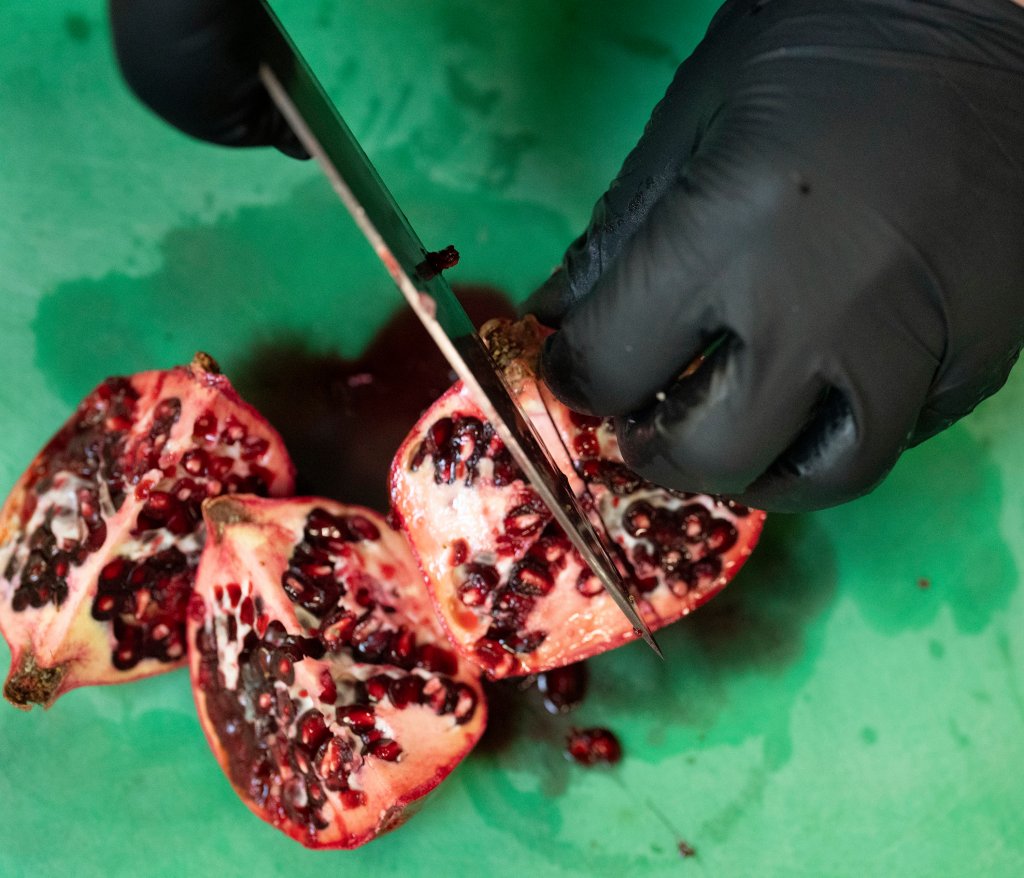 Eric Bufo cuts open a pomegranate to remove the seeds, with plans to turn them into a reduction, at the Wayside Food Programs kitchen in Portland on Nov. 11. (Gregory Rec/Staff Photographer)
Eric Bufo cuts open a pomegranate to remove the seeds, with plans to turn them into a reduction, at the Wayside Food Programs kitchen in Portland on Nov. 11. (Gregory Rec/Staff Photographer)
Bufo hopes to recruit local professional chefs to take volunteer shifts, and expects they’ll see the value of using their talents in this way. “People’s willingness to engage with their neighbors and help is unique here,” he said. “You see that in some cities, but Portland seems especially community-minded.”
As he wraps up his roasted apples and squash to marinate overnight in spiced brown butter, Bufo checks on progress with the slaw. The seasoned volunteer has made quick work of it, fleshing out the cabbage with expertly julienned bell peppers, carrots, and fresh cranberries. He and Bufo talk about how the dressing should be bright and acidic, to balance the sweet richness of the squash side.
“It’s incredible what we can turn out with food that’s technically undesired,” McFarland said.
“We can’t say we’re a food city if good food is only accessible to certain people, or people who are in town for vacation,” Bufo said. “We take pride in our food in Portland, so why not extend that to everyone?”


Dining and Cooking